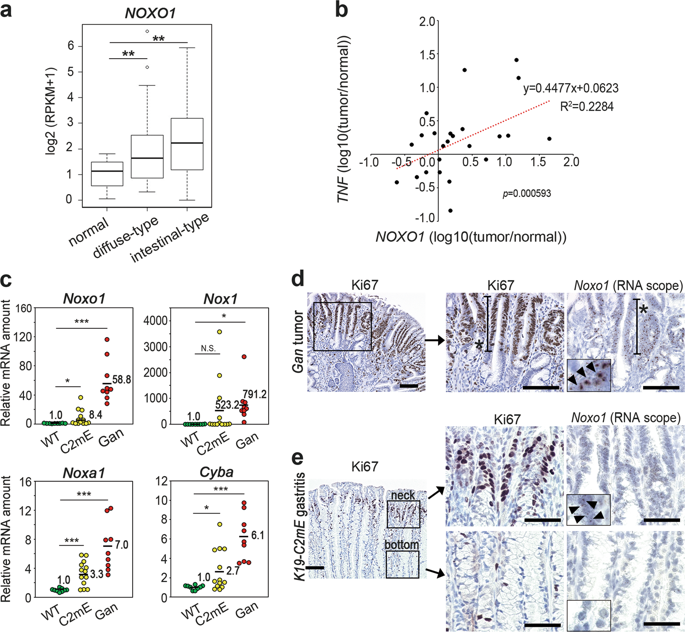Our official English website, www.x-mol.net, welcomes your
feedback! (Note: you will need to create a separate account there.)
NF-κB-induced NOX1 activation promotes gastric tumorigenesis through the expansion of SOX2-positive epithelial cells.
Oncogene ( IF 6.9 ) Pub Date : 2019-01-30 , DOI: 10.1038/s41388-019-0702-0 Kanae Echizen 1, 2 , Keigo Horiuchi 1 , Yayoi Aoki 1 , Yoichi Yamada 3 , Toshinari Minamoto 4 , Hiroko Oshima 1, 5 , Masanobu Oshima 1, 2, 5
Oncogene ( IF 6.9 ) Pub Date : 2019-01-30 , DOI: 10.1038/s41388-019-0702-0 Kanae Echizen 1, 2 , Keigo Horiuchi 1 , Yayoi Aoki 1 , Yoichi Yamada 3 , Toshinari Minamoto 4 , Hiroko Oshima 1, 5 , Masanobu Oshima 1, 2, 5
Affiliation

|
We previously showed that NADPH oxidase organizer 1 (Noxo1), a component of NADPH oxidase 1 (NOX1), is a TNF-α-induced tumor-promoting factor in gastric tumorigenesis. However, the mechanism of NOX1-induced reactive oxygen species (ROS) signaling for the gastric tumorigenesis has not been understood. Here, we showed that expression of NOX1 complex components, including Noxo1, but not other NOX family members was significantly upregulated in both mouse models for gastritis and gastric tumors, which was associated with increased ROS levels. We also found that NF-κB directly regulated NOXO1 expression in TNF-α-stimulated gastric cancer cells, suggesting that inflammation induces NOX1 complex activation through TNF-α/NF-κB pathway. Notably, in situ hybridization indicated that Noxo1 mRNA was detected in proliferating cells of gastritis and gastric tumors, and pharmacological inhibition of NOX activity significantly suppressed the proliferation of MKN45 gastric cancer cells and gastric hyperplasia of K19-C2mE mice. These results suggest that NOX1/ROS signaling has an important role in increased proliferation of stomach epithelial cells in the inflamed mucosa. Moreover, we found that expression of SOX2, a marker of gastric epithelial stem cells, was increased by NOX1/ROS signaling. Furthermore, disruption of Noxo1 in K19-C2mE mice significantly suppressed gastritis-associated metaplastic hyperplasia, a potent preneoplastic lesion, which was associated with decreased number of SOX2-positive cells. These results indicate that inflammation-induced Noxo1 expression is responsible for development of metaplastic hyperplasia in the stomach through an increase in SOX2-expressing undifferentiated epithelial cells. Therefore, inhibition of the NOX1/ROS signaling pathway is a possible strategy for prevention and therapy for gastric cancer development.
中文翻译:

NF-κB诱导的NOX1活化通过SOX2阳性上皮细胞的扩增促进胃肿瘤发生。
我们以前表明,NADPH氧化酶组织者1(Noxo1),NADPH氧化酶1(NOX1)的组成部分,是TNF-α诱导的胃癌发生中的肿瘤促进因子。但是,尚不了解NOX1诱导的活性氧(ROS)信号在胃肿瘤发生中的机制。在这里,我们显示了在胃炎和胃肿瘤的两种小鼠模型中,NOX1复杂成分(包括Noxo1)的表达均显着上调,包括NOxo1,而其他NOX家族成员均未上调,这与ROS水平升高有关。我们还发现,NF-κB直接调节TNF-α刺激的胃癌细胞中NOXO1的表达,这表明炎症通过TNF-α/NF-κB途径诱导了NOX1复合物的激活。尤其,原位杂交表明在胃炎和胃肿瘤的增殖细胞中检测到Noxo1 mRNA,并且药理抑制NOX活性可显着抑制MKN45胃癌细胞的增殖和K19-C2mE小鼠的胃增生。这些结果表明,NOX1 / ROS信号传导在发炎的粘膜中增加胃上皮细胞的增殖中具有重要作用。此外,我们发现,NOX1 / ROS信号转导增加了胃上皮干细胞标志物SOX2的表达。此外,在K19-C2mE小鼠体内Noxo1的破坏显着抑制了胃炎相关的化生增生,这是一种强有力的肿瘤前病变,与SOX2阳性细胞数量减少有关。这些结果表明,炎症诱导的Noxo1表达通过增加表达SOX2的未分化上皮细胞而导致胃中化生增生的发展。因此,抑制NOX1 / ROS信号通路是预防和治疗胃癌发展的可能策略。
更新日期:2019-01-30
中文翻译:

NF-κB诱导的NOX1活化通过SOX2阳性上皮细胞的扩增促进胃肿瘤发生。
我们以前表明,NADPH氧化酶组织者1(Noxo1),NADPH氧化酶1(NOX1)的组成部分,是TNF-α诱导的胃癌发生中的肿瘤促进因子。但是,尚不了解NOX1诱导的活性氧(ROS)信号在胃肿瘤发生中的机制。在这里,我们显示了在胃炎和胃肿瘤的两种小鼠模型中,NOX1复杂成分(包括Noxo1)的表达均显着上调,包括NOxo1,而其他NOX家族成员均未上调,这与ROS水平升高有关。我们还发现,NF-κB直接调节TNF-α刺激的胃癌细胞中NOXO1的表达,这表明炎症通过TNF-α/NF-κB途径诱导了NOX1复合物的激活。尤其,原位杂交表明在胃炎和胃肿瘤的增殖细胞中检测到Noxo1 mRNA,并且药理抑制NOX活性可显着抑制MKN45胃癌细胞的增殖和K19-C2mE小鼠的胃增生。这些结果表明,NOX1 / ROS信号传导在发炎的粘膜中增加胃上皮细胞的增殖中具有重要作用。此外,我们发现,NOX1 / ROS信号转导增加了胃上皮干细胞标志物SOX2的表达。此外,在K19-C2mE小鼠体内Noxo1的破坏显着抑制了胃炎相关的化生增生,这是一种强有力的肿瘤前病变,与SOX2阳性细胞数量减少有关。这些结果表明,炎症诱导的Noxo1表达通过增加表达SOX2的未分化上皮细胞而导致胃中化生增生的发展。因此,抑制NOX1 / ROS信号通路是预防和治疗胃癌发展的可能策略。











































 京公网安备 11010802027423号
京公网安备 11010802027423号